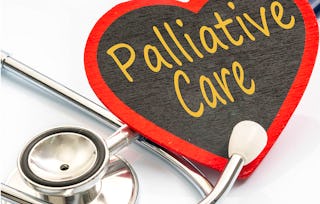This course should be taken after the Essentials of Palliative Care course and continues building your primary palliative care skills – communication, psychosocial support and goals of care. You will learn how to screen, assess, and manage both physical and psychological symptoms. You will explore common symptoms such as pain, nausea, fatigue, and distress and learn specific treatments. You will continue to follow Sarah and Tim’s experience and learn cultural competencies critical for optimal symptom management.

Symptom Management in Palliative Care

Symptom Management in Palliative Care
This course is part of Palliative Care Always Specialization



Instructors: Kavitha Ramchandran
2,838 already enrolled
(36 reviews)
Recommended experience
What you'll learn
Respond to the subjective experience of symptoms and side effects using assessment tools and communication skills
Conduct a pain assessment and provide basic pain management using medication and lifestyle modification
Describe several interventions to help with emotions and coping and the role the palliative care psychiatrist plays in caring for the patient
Define distress and common causes of emotional distress related to life-threatening illness
Skills you'll gain
Details to know

Add to your LinkedIn profile
See how employees at top companies are mastering in-demand skills

Build your subject-matter expertise
- Learn new concepts from industry experts
- Gain a foundational understanding of a subject or tool
- Develop job-relevant skills with hands-on projects
- Earn a shareable career certificate

There are 6 modules in this course
Regular assessment and management of physical and psychological symptoms is critical to treatment adherence and quality of life for patients. Still, symptoms such as pain, nausea and distress are often under-treated. Palliative care specialists can help when symptoms are difficult to manage. People with a life-threatening diagnosis often experience symptoms that change regularly and may persist as chronic issues throughout life. We discuss common symptoms experienced by people such as pain, nausea and fatigue. Poorly managed symptoms often lead to isolation from regular activities and increased psychological distress. Some patients cite a loss of identity that comes along with life being defined by the experience of symptoms and side effects. In this course, you will learn more about how to identify, assess and manage common physical and psychological symptoms.
What's included
3 readings2 assignments
This module reviews the concepts learned in the Essentials of Palliative Care course and a brief summary of the symptoms covered in the Symptom Management course. We realize that some learners are interested in only completing specific courses while others are moving through the entire specialization. The following videos are meant as a review for those who have not completed the other courses. You are not required to watch these videos if you feel you have a strong handle on the material. You can check your knowledge with the ungraded quiz in the next section and review the summary videos if necessary. Also contained in this module are the Sarah case study videos from Essentials of Palliative Care for those who want to review her story.
What's included
7 videos2 readings1 assignment
This module focuses on pain assessment and management for patients suffering from serious illness. We will also address how pain is subjective and why communication is critical to get a better understanding of a patient's experience.
What's included
2 videos5 readings3 assignments1 discussion prompt2 plugins
In this module, you will learn more about how to identify, assess and manage common physical symptoms that affect patients with serious illnesses.
What's included
3 videos8 readings5 assignments1 discussion prompt2 plugins
Emotional distress is common for patients and families living with a serious illness. Distress may surface as a result of, among other things: physical symptoms, fears, uncertainty, or a sense of losing one’s identity. Palliative care, in part, addresses the relationship between disease, stress, social roles and emotional manifestations to improve quality of life for patients and families. Often times this involves managing the emotional adjustment to a diagnosis or at other transition points during the course of disease and survivorship. Patients report that emotional wellbeing is one of the biggest influencers on quality of life. Still, emotional distress is often underreported and under treated. This module will help providers and caregivers conduct a basic screening and assessment for emotional distress and identify several ways to manage distress for those living with serious illness.
What's included
4 videos5 readings3 assignments1 discussion prompt
Congratulations on completing the course content. You have a few more step to complete the course. First review your reflection, next complete a peer-reviewed course project and then take the final exam. We hope you have enjoyed the course and look forward to seeing you in other classes!
What's included
1 reading2 assignments1 peer review
Earn a career certificate
Add this credential to your LinkedIn profile, resume, or CV. Share it on social media and in your performance review.
Instructors



Offered by
Explore more from Patient Care
 Status: Free Trial
Status: Free TrialStanford University
 Status: Free Trial
Status: Free TrialUniversity of Colorado System
 Status: Free Trial
Status: Free TrialStanford University
 Status: Free Trial
Status: Free TrialUniversity of Colorado System
Why people choose Coursera for their career

Felipe M.

Jennifer J.

Larry W.

Chaitanya A.
Learner reviews
- 5 stars
86.11%
- 4 stars
5.55%
- 3 stars
2.77%
- 2 stars
2.77%
- 1 star
2.77%
Showing 3 of 36
Reviewed on Jun 1, 2023
I love the practical part of the learning. The use of cases makes it easy to comprehend how to actually work with the patients

Open new doors with Coursera Plus
Unlimited access to 10,000+ world-class courses, hands-on projects, and job-ready certificate programs - all included in your subscription
Advance your career with an online degree
Earn a degree from world-class universities - 100% online
Join over 3,400 global companies that choose Coursera for Business
Upskill your employees to excel in the digital economy
Frequently asked questions
Dates and Duration Original Release Date: 09/30/2023 Expiration Date: 09/29/2026 Estimated Time to Complete: 9 hours 45 minutes Accreditation In support of improving patient care, Stanford Medicine is jointly accredited by the Accreditation Council for Continuing Medical Education (ACCME), the Accreditation Council for Pharmacy Education (ACPE), and the American Nurses Credentialing Center (ANCC), to provide continuing education for the healthcare team. Credit Designation American Medical Association (AMA) Stanford Medicine designates this enduring material for a maximum of 9.75 AMA PRA Category 1 CreditsTM. Physicians should claim only the credit commensurate with the extent of their participation in the activity. American Nurses Credentialing Center (ANCC) Stanford Medicine designates this enduring material activity for a maximum of 9.75 ANCC contact hours. ASWB Approved Continuing Education Credit (ACE) – Social Work Credit As a Jointly Accredited Organization, Stanford Medicine is approved to offer social work continuing education by the Association of Social Work Boards (ASWB) Approved Continuing Education (ACE) program. Organizations, not individual courses, are approved under this program. State and provincial regulatory boards have the final authority to determine whether an individual course may be accepted for continuing education credit. Stanford Medicine maintains responsibility for this course. Social workers completing this activity receive 9.75 enduring material continuing education credits. American Academy of Physician Assistants (AAPA) - Enduring Materials Stanford Medicine has been authorized by the American Academy of PAs (AAPA) to award AAPA Category 1 CME credit for activities planned in accordance with AAPA CME Criteria. This enduring activity is designated for 9.75 AAPA Category 1 CME credits. Approval is valid until 09/29/26. PAs should only claim credit commensurate with the extent of their participation. Disclosure Stanford Medicine adheres to the Standards for Integrity and Independence in Accredited Continuing Education. There are no relevant financial relationships with ACCME-defined ineligible companies for anyone who was in control of the content of this activity.
View more at https://stanford.cloud-cme.com/course/courseoverview?P=0&EID=47067
To access the course materials, assignments and to earn a Certificate, you will need to purchase the Certificate experience when you enroll in a course. You can try a Free Trial instead, or apply for Financial Aid. The course may offer 'Full Course, No Certificate' instead. This option lets you see all course materials, submit required assessments, and get a final grade. This also means that you will not be able to purchase a Certificate experience.
When you enroll in the course, you get access to all of the courses in the Specialization, and you earn a certificate when you complete the work. Your electronic Certificate will be added to your Accomplishments page - from there, you can print your Certificate or add it to your LinkedIn profile.
More questions
Financial aid available,
¹ Some assignments in this course are AI-graded. For these assignments, your data will be used in accordance with Coursera's Privacy Notice.


